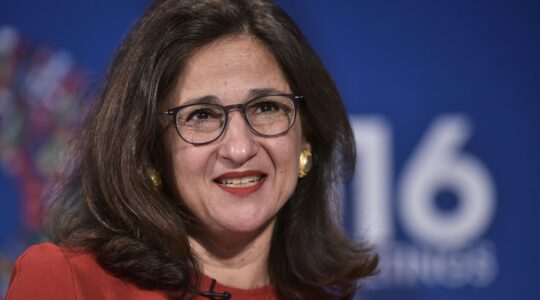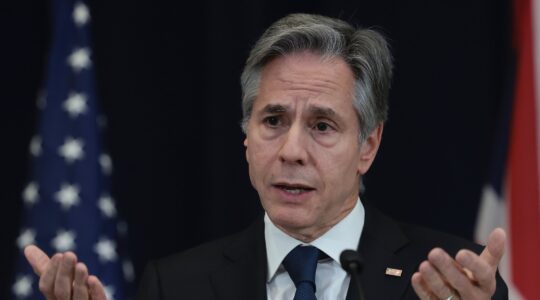NEW YORK (JTA) – The growing ideological gap between the Orthodox and non-Orthodox threatens the long-term unity of the Jewish people, several communal leaders said at a forum to address the matter.
At issue were the results of a survey conducted in November by the American Jewish Committee, which found widening differences between the Orthodox and non-Orthodox on a range of issues.
The Jan. 31 forum convened by the AJC and the Orthodox Union also included leaders of the Reform movement.
The AJC’s 2007 Annual Survey of American Jewish Opinion focused mainly on the political preferences and concerns of Jews leading into this election season.
It showed that while Jews across the religious spectrum have maintained their political party affiliation, on specific issues the Orthodox are becoming much more conservative than Jews who affiliate with the more liberal religious streams of Judaism.
This trend raises serious questions about whether the Jews are still capable of remaining a cohesive people, said the AJC’s executive director, David Harris, who moderated the forum.
“We are all Jews. But do we share everything, including a common language?” Harris asked during the event at the AJC’s Manhattan headquarters.
“A number of us have been asking this more and more frequently in part because of findings in the AJC’s annual survey, which speaks to a divide. And the question is how significant is this divide, and what does this say about future conversations within the Jewish people, and to the extent that it is real, can it be bridged?”
The most significant differences in opinion between the Orthodox and non-Orthodox center on Israel and the Iraq war, according to the survey, which has been conducted annually since 1997.
According to the survey, 69 percent of Orthodox Jews said they feel “very close” to Israel, compared to 29 percent of Conservative Jews and 22 percent of Reform Jews. Only 4 percent of the Orthodox said they feel “fairly distant,” as opposed to 14 percent of Conservatives and 25 percent of the Reform.
Fifty-seven percent of Orthodox Jews said the United States “did the right thing” when it invaded Iraq and support U.S. military action against Iran. Only 27 percent of Conservative Jews backed the Iraq war and 38 percent favored strikes against the Islamic Republic; among Reform Jews the totals were 22 percent and 32 percent.
Nathan Diament, the O.U.’s director of public policy, downplayed the differences in opinion, saying that Orthodox Jewish thinking on Iran, Israel and security issues are very close to the thinking of the leadership of the most influential Jewish organizations.
Other panelists, however, said the divide between Orthodox and non-Orthodox Jews on the street is dangerous.
“If one were to look at the American Jewish community, the type of unity that formerly marked us in regard to religious state issues – not just foreign policy questions – that type of unity has become attenuated,” said Rabbi David Ellenson, the president of the Reform movement’s seminary, the Hebrew Union College-Jewish Institute of Religion.
Sylvia Barack Fishman, a professor of contemporary Jewish life at Brandeis University, suggested that the gaps are explained in large part by a greater commitment among Orthodox Jews to the idea of Jewish peoplehood.
In the liberal religious communities, she said, the leaders may be thinking about the issue, but their followers are generally apathetic and Jewishly illiterate.
The divide is exacerbated by an Orthodox community that is becoming more and more right wing, due largely to the amount of time that young Orthodox Jews spend in Israel, according to Steven Bayme, the director of the AJC’s Department of Contemporary Jewish Life.
It has become a rite of passage for Orthodox Jewish day school and yeshiva students to spend a year or two years studying at yeshivas in Israel after high school and before college. Those yeshivas, Bayme said, are ideologically incompatible with mainstream American Jewish thought.
“The faculties at the institutions they attend tend to project attitudes that are far more to the conservative end of the spectrum on all the social political issues and are in many ways dissonant from the dominant attitudes of American Jews in general,” said Bayme, who is Modern Orthodox.
The divide only stands to get worse as the Orthodox grow in importance, Bayme predicted.
Orthodox Jews now account for about 9 percent of Jews who affiliate with a synagogue, but they comprise 17 percent of the affiliated population aged 19-25. About 228,000 Orthodox Jews are younger than 18, compared to 155,000 Conservative and 190,000 Reform – Orthodox children, in other words, make up 38 percent of that younger cohort.
“If you are looking at the next generation of who will be Jewish leaders, in the year 2050,” Bayme said, “if you are looking at who is going to be sufficiently concerned about Jewish community and Jewish peoplehood activities, one sociologist suggests that 50 percent of that universe of people concerned with Jewish life may be Orthodox.”






